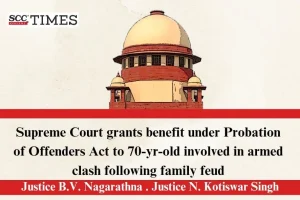Supreme Court: In a criminal appeal against the Rajasthan High Court’s decision, whereby, the convict’s plea for setting aside his conviction was partly allowed, the Division Bench of B.V. Nagarathna and N. Kotiswar Singh*, JJ. allowed the appeal by directing the release of the convict, extending the benefit of Section 4 of the Probation of Offenders Act, 1958, considering that a similar benefit was granted to the other accused persons in the cross-case and that a settlement was reached between the parties and neither any criminal antecedents nor any adverse material against the conduct of the convict was present.
The Court directed the convict to execute a personal bond of Rs.10,000/- with surety of like amount for six months with the undertaking that he will maintain peace and good conduct in the society, and that he will not repeat the crime and will appear at his own expense to face punishment when called by the Court.
Background
The convict’s case was that a complaint in the present matter was filed by the complainant, who was accused in the cross-case filed by the present convict and others. According to the convict, there was a running feud between two groups of the family which resulted in an armed clash between these groups and culminated in the filing of separate complaints by the respective groups because of which two FIRs came to be filed.
The trial proceeded separately resulting in two different outcomes in which one group of accused was convicted and in the other case (cross-case), the other group of accused was partly convicted for offences but benefit under the Probation of Offenders Act, 1958 (‘Probation Act’) was granted.
The convict’s case was that the cross-case with similar charges which was decided by the Magistrate, District Karauli by taking into consideration a settlement arrived between the disputing parties and directed the release of the accused person therein on probation. The convict pleaded that the same benefit may be extended to him since these two criminal proceedings arose out of two complaints related to the same incident of clash between two groups of the same family occurring on the same day, and the said dispute was amicably settled during the pendency of the matter before the Magistrate, District Karauli.
The Trial Court convicted the present convict under Sections 148, 307/149, 326, 323/149, and 452 of the Penal Code, 1860 (‘IPC’). Five others were also convicted under Sections 148, 452, 323, 307, 326, and 325 of the IPC. In an appeal against the conviction, the High Court set aside the conviction and sentence imposed on four convicts, however, regarding the present convict’s plea, the High Court allowed the same partly by setting aside the conviction and sentence under Sections 307, 148 and 149 of the IPC but affirmed his conviction under Sections 326, 325, 452 and 323 of the IPC. The sentence imposed by the Trial Court was modified. The convict submitted that he had undergone more than four months and only 54 days remained to complete the six-months of simple imprisonment imposed by the High Court.
Analysis and Decision
The Court noted that the convict was sentenced to undergo rigorous imprisonment of six months with a fine of Rs.5000/-, simple imprisonment of two months with a fine of Rs.1000/- under Section 325 IPC, simple imprisonment of one month with a fine of Rs.1000 under Section 452 IPC and simple imprisonment of seven days under Section 323 of the IPC. Thus, the maximum sentence to be undergone by the convict was six months of simple imprisonment.
Perusing the records, the Bench said that the two criminal cases were in reality cross cases filed by two groups of the family because of certain family disputes, and the genesis of both the criminal cases was traced to the clash between the two conflicting groups which occurred on the same day. Further, the Court noted that while the cross-case was pending before the Magistrate, the disputing parties decided to bury their differences and a compromise was reached between the parties. The Court said that the convict was convicted of the offences under Sections 326, 325, 452, and 323 of the IPC but was acquitted by the High Court of the more serious charges under Sections 307, 148, and 149 of the IPC. The Court also noted that the convict had apprised the High Court of the settlement between the parties which was taken into consideration by the Magistrate in the cross-case, but the same was not favorably considered by the High Court.
Hence, taking a different view than that taken by the High Court, the Court said that there was no reason why the benefit of the Probation Act could not be extended to the convict, which was extended to the other accused in the cross-case. The Court stated that the present convict is about 70-years-old and his conviction under the more serious offence under Section 307 of the IPC was set aside by the High Court and was convicted only under Sections 326, 325, 452 and 323 of the IPC and the maximum period of punishment awarded by the High Court was six months imprisonment with a fine of Rs.5000/-.
Therefore, invoking the jurisdiction under Article 142 of the Constitution of India, the Court allowed the appeal and granted the benefit of the Probation Act to the convict also, which had been granted to the other accused belonging to the other conflicting group in the cross-case, considering the fact that a settlement was reached between the parties and neither any criminal antecedents nor any adverse material against the conduct of the convict was present.
CASE DETAILS
|
Citation: Appellants : Respondents : |
Advocates who appeared in this case For Appellant(s): For Convict(s): |
CORAM :


